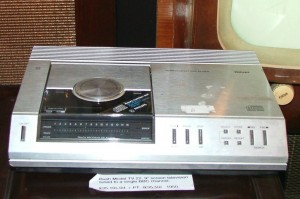This is the season for end-of-the-decade roundups, and the tone has been glum. I’m inclined to agree with Reihan Salam’s contrarian take: we shouldn’t let the obvious negative trends blind us to positive trends that are subtler but may be more important in the long run. In technology, for example:
At first, the iPhone was a way for people to cram a cell phone, iPod, and datebook in the slender pockets of your skinny jeans. With the advent of applications, it’s become an infinitely expandable device that is much more like a baby computer than a cellphone on steroids. It’s only natural that people are increasingly transitioning from expensive laptops to cheapo netbooks that work on the rare occasions when the iPhone won’t do the job. The iPhone is leading us towards an age of constant connectivity. In the not-too-distant future, your phone, smaller than a fingernail or perhaps a strand of hair, will constantly monitor your vital signs, just in case you’re on the verge of catching a cold. It will even warn you when an ex is around the corner, sparing you an awkward encounter. And without this low dishonorable decade, it would never have happened. Astonishing increases in the quality of the goods we consume like these won’t be captured in crude measurements like GDP, despite the fact that it is a real source of wealth. As grumpy as you might feel on New Year’s Eve, would you really want to go back to the bulky CD players, the lousy supermarkets, and the VHS cassettes of yesteryear? Of course not.
And culture:
the explosion of file-sharing eventually forced a transformation of popular music, dethroning the small oligopoly of major record labels and empowering a new generation of DIY artists. Owl City, a kid from small-town Minnesota, began his spectacular climb up the pop charts by posting his homemade recordings to his MySpace page. A number of truly brilliant and bizarre musicians, like Chad Vangaalen, took a similar path, although not to the same radio-friendly destination. And that’s the whole point—new distribution channels have enabled a larger number of artists and musicians to find audiences and to support themselves by touring, or by adding a modest income from the sale of digital downloads to more-or-less tolerable day-jobs as web designers or prop stylists. This decade saw a turn towards a more diverse and more interesting pop culture.
It’s trendy to claim that ordinary Americans have been losing ground economically over the last decade (if not the last four decades). Reasonable people can disagree about what the official statistics show, but I think Reihan highlights the extent to which government economic statistics have contestable value judgments baked into them from the outset. I derive tremendous value from Wikipedia, Google, free iPhone apps, and the like. Yet official statistics on GDP growth, wages, and the like implicitly assign a value of zero to these things. Likewise, the official statistics don’t do a good job of capturing the roughly 50-fold performance difference between the MacBook Pro I have today and the iMac I had a decade ago, the benefits of being able to watch “The Sopranos” and “30 Rock” instead of “Gunsmoke” and “I Love Lucy,” or the vast differences between Hotmail circa 2000 and GMail 2010.
Now obviously I’m a big nerd, so these kinds of improvements are more important to me than they are to the average American. But the benefits of this kind of unpriced technological progress is hardly constrained to the pocket protector set. My wife’s life is enriched by her access to a vast community of online knitters that didn’t exist 20 years ago, and online retailers offer her a much richer array of high-quality knitting equipment than she could have found before the web. The proliferation of cell phones in low-income communities is erasing the digital divide by allowing minority households to get online via their cell phones. For reasons that aren’t entirely clear to me, the last quarter century has seen an explosion of micro-breweries that have improved the variety and quality of the beer we drink.
I can’t really blame government number-crunchers for failing to take these trends into account. For the most part they don’t have dollar figures attached to them, so it’s hard to see how they could be incorporated into official statistics. But that means we need to think carefully about what these statistics mean. A growing share of our wealth is not just intangible but unpriced. Which means that official economic statistics are going to systematically under-state the amount of wealth we’re collectively creating.
Reihan talks in more detail about his optimistic and increasingly bottom-up view of the world in this Blogging Heads episode with Ross Douthat.




